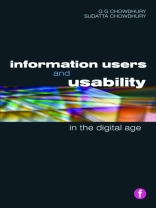Information users and usability constitute the main building blocks of today’s electronic information world. This important new text is the first to give a holistic overview of all of the necessary issues relating to information users and the usability of information services in the digital world, including user-centred design, and the characteristics and behaviour of information users.
This book helps readers understand why information users and the usability of information services are important and equips them to play a proper role in designing user-centred information systems and services and to properly exploit information services for the maximum benefit of users. It covers all of the major issues, the current situation and what the various research studies from around the world show. The chapters are:
- An introduction to information users and usability
- Information needs and user studies
- Human information behaviour studies and models
- Usability study basics
- Usability study participants
- Usability data analysis
- Web usability
- The usability of digital libraries
- Digital divide, digital natives and usability
- Issues and trends in usability research.
Readership : The is essential reading for researchers and practitioners interested in the design and evaluation of digital information systems and services, as well as for students on library, information, and digital library courses.
Jadual kandungan
1. Introduction
- Information users
- Users in the web environment
- User studies
- Human information behaviour
- The usability and evaluation of information services
- So, what’s the problem?
- About this book
- Summary
- References
2. Information needs and user studies
- Introduction
- Information needs
- Analysis of information needs
- User studies
- Factors affecting information needs
- User study methods
- Qualitative vs quantitative research in user studies
- Methods of data collection
- Summary
- References
3. Human information behaviour studies and models
- Introduction
- Human information behaviour
- Information seeking and retrieval
- Models in human information behaviour and information seeking and retrieval
- Information seeking on the web
- Some new information seeking behaviour models
- Summary
- References
4. Usability study basics
- Introduction
- Usability
- How to conduct a usability study
- Summary
- References
5. Usability study participants
- Introduction
- Selection of study participants
- Challenges when selecting study participants
- Summary
- References
6. Usability data analysis
- Introduction
- Data types
- Independent vs dependent variables
- Nominal vs ordinal data
- Descriptive vs inferential statistics
- Parametric vs non-parametric tests
- Comparing means: t-tests vs ANOVA tests
- Correlation analysis
- Chi square tests
- Qualitative analysis
- Summary
- References
7. Web usability
- Introduction
- What are the challenges?
- Which method?
- User-centred design and accessibility issues
- Web usability and accessibility
- Usability metrics and heuristic evaluation
- Summary
- References
8. The usability of digital libraries
- Introduction
- Approaches to digital library usability studies
- Usability factors in digital libraries
- Digital library usability study models and techniques
- Usability studies conducted by members of the Digital Library
- Federation
- Usability studies of Europeana Digital Library
- MEDLIS: a digital library usability model
- Summary
- References
9. The digital divide, digital natives and usability
- Introduction
- Connotations of the digital divide
- Indicators of digital divide
- Digital divide indicators and usability
- The digital divide and digital natives
- Information skills and usability
- Context and the digital divide
- Summary
- References
10. Issues and trends in usability research
- Introduction
- Usability methods and techniques
- External factors affecting usability
- Emerging technologies for access to digital content
- Usability of e-books
- Emerging access and business models
- Social challenges: the digital divide and information skills
- Conclusion
- References
Mengenai Pengarang
Professor Gobinda Chowdhury BSc Hons, MSc, Ph D, FCLIP is Professor in Information Science at i School@northumbria, and Head of the Department of Mathematics and Information Sciences at Northumbria University. Before joining Northumbria University he was a Professor and Director of the Centre for Information and Knowledge Management at the University of Technology Sydney, Australia. For over 25 years he has worked as an academic and researcher in information science in different parts of the world including Asia, Africa, Europe and Australia. For the past few years he has been actively involved in the i Schools activities. Professor Chowdhury has written or edited 15 books and over 150 research papers.












